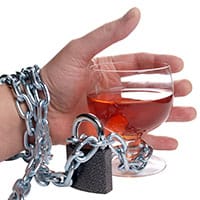The onset of alcohol use disorder (alcohol abuse/alcoholism) is one of the most likely diagnosable mental health consequences of military service. Just like full-time military personnel, risks for the disorder affect National Guard personnel called up for active duty. In a study scheduled for publication in 2014 in the American Journal of Preventive Medicine, researchers from four American universities explored the factors that make alcohol use disorder more likely to occur in national guardsmen. These researchers concluded that the key influence is stress related to a return to civilian life after a period of active service comes to an end.
Alcohol Use Disorder
Alcohol use disorder is the modern diagnosis for mild, moderate or severe cases of alcohol abuse and alcoholism. The American Psychiatric Association created this diagnosis in 2013 as part of a larger reorganization of the terms used to describe substance problems and forms of addiction not related to substance use. A person with alcohol use disorder has potentially overlapping symptoms previously associated only with alcohol abuse or only with alcoholism. Since a modern scientific consensus indicates that symptoms of the two conditions are intertwined, doctors now give equal weight to both alcohol-related problems when making a diagnosis. In the mildest cases, alcohol use disorder manifests as two or three out of 11 symptoms that can appear at the same time or within a short span of time. Severe cases involve at least six symptoms.
Alcohol Problems and Military Service
Risks for problematic alcohol consumption have long been linked to military service, particularly for those people who see combat or serve in an area where combat exposure remains a possibility. Unfortunately, alcohol problems commonly don’t end when military service ends; in fact, they can grow worse. The federal Health Resources and Services Administration cites a number of reasons military veterans (including both full-time personnel and National Guard personnel) can encounter alcohol-related issues or other substance-related issues after returning to civilian life. These reasons include a military culture that emphasizes drinking while de-emphasizing the legitimacy of drinking problems, the relatively long tours of duty for today’s active personnel, loss of the structure and military routine associated with active service, lack of understanding of the mental health resources available after active service, the decision not to access available mental health resources after active service and a desire to hide the presence of serious alcohol problems and/or other substance problems.
Factors for National Guard Personnel
In the study scheduled for publication in the American Journal of Preventive Medicine, researchers from Columbia University, Case Western Reserve University, the University of Michigan and the University of Toledo used an examination of Ohio National Guard troops deployed for active duty in 2008 or 2009 to determine which factors contribute to the risks for alcohol use disorder after active duty comes to an end. All of the 1,095 veterans chosen for the project served in Afghanistan or Iraq. Each participant agreed to be interviewed on three occasions over the course of three years. The researchers gathered information from all of the National Guard veterans on topics that included their habitual patterns of alcohol consumption, their exposure to significant service-related stress or traumatic situations (e.g., combat or seeing other people get injured or die) and their exposure to significant stress in the aftermath of service (e.g., marital or financial problems, legal difficulties or employment disruptions). The researchers found that roughly 60 percent of the study participants experienced significantly stressful or traumatic situations related to combat exposure. In addition, roughly 36 percent experienced significantly stressful events after returning to civilian life. The peak rate for alcohol use disorder (13 percent) occurred at the time of the initial interview sessions; the lowest rate (5 percent) occurred at the time of the last interview sessions. After analyzing the relative alcohol use disorder risks of combat-related stress and the stress of a return to civilian life, the researchers concluded that the stress experienced after active service is the major factor, not stress experienced while on a tour of duty. The researchers also looked at the alcohol use disorder-related impact of experiencing sexual harassment from other service personnel while on active duty (17 percent of the study participants reported exposure to such harassment). They concluded that exposure to at least one episode of sexual harassment also increased the chances that a National Guard veteran would develop alcohol use disorder. The risks from civilian stress and sexual harassment applied to people newly affected by the disorder, not to people with previously existing alcohol problems.




